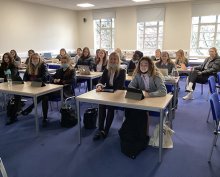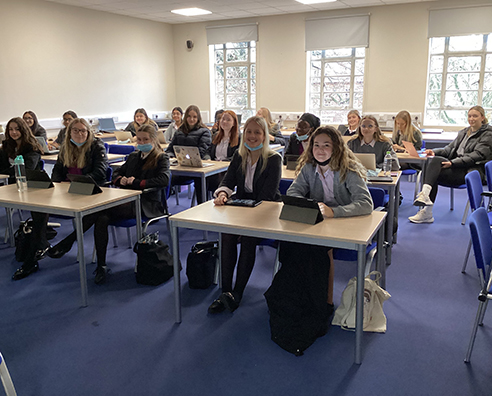
On Friday 26th September, the Sixth Form Economics student attended the virtual Economics in Action Conference organised by The Training Partnership.
The students enjoyed listening to engaging speakers covering a range of economics topics. Here are a few of the attendee’s comments:
Matisha Joshi (Upper Sixth): “I really enjoyed the conference because of how much was covered; all the speakers talked about different topics ranging from the economics of the labour markets to climate change, and the ways in which their topics were linked to the world today were eye-opening and allowed me to view current affairs from a different perspective. All the speakers were engaging and their simple yet extensive explanations of the topics made it a really intriguing day. My favourite talk was from Anna Bird, who introduced us to the world of behavioural economics in policy-making. It really opened my eyes to how much behavioural economics plays a part in different parts of life, not just economics, and it really encouraged me to learn more, and possibly take more behavioural economics modules in university. For example, she spoke about how students and schools can implement "nudges" to studying, and how there has been evidence that incorporating these nudges can improve grades. The event's host Bobby Seagull's talk on financial markets and his background in both mathematics and investment trading prompted me to find out more about cryptocurrency, and possibly trading cryptocurrency myself.”
Aimee Hughes (Lower Sixth) added: “The first topic about The Labour Market was very interesting, and it was a good experience to have a speaker who works in the Resolution Foundation and portrayed their goals of focussing on improving living standards for low-middle income households. The talk on ‘Applying behavioural economics to policy and social problems’ broadened my views on human behaviour and the graphs were helpful to link the descriptions to something visual. I learnt a lot from this one such as about improving social outcomes by applying psychology, and changing behaviours using ‘EAST’ (easy, attractive, social, timely). These two were my favourite topics as I found they extended my knowledge. However, I enjoyed all of the talks and found the one about exam techniques and tips extremely helpful. The organisation of the event was very good and I liked the questions that the audience could ask, and open questions and polls which the speakers would use to get listeners involved. I would definitely recommend this to anyone studying economics or even just with a keen interest in the subject.”
Annabelle Sivills (Lower Sixth) commented: “The conference had many experienced economists talk about their topics of speciality. Some of these topics highlighted included an introduction to the Resolution Foundation, Behavioural Economics and the problems with the measure of GDP. To me, the speaker which I felt was the most informative was Ayeisha Thomas-Smith, she effectively displayed the issues with the common measure of GDP to calculate the growth of an economy. In this way, GDP fails to consider many factors, including the environment and voluntary work. From GDP, it is difficult to determine where the surplus is going, whether it is aiding the poorer population or attending the pockets of the much richer society. In conclusion, I thought the lectures were well planned and attentive.”





















